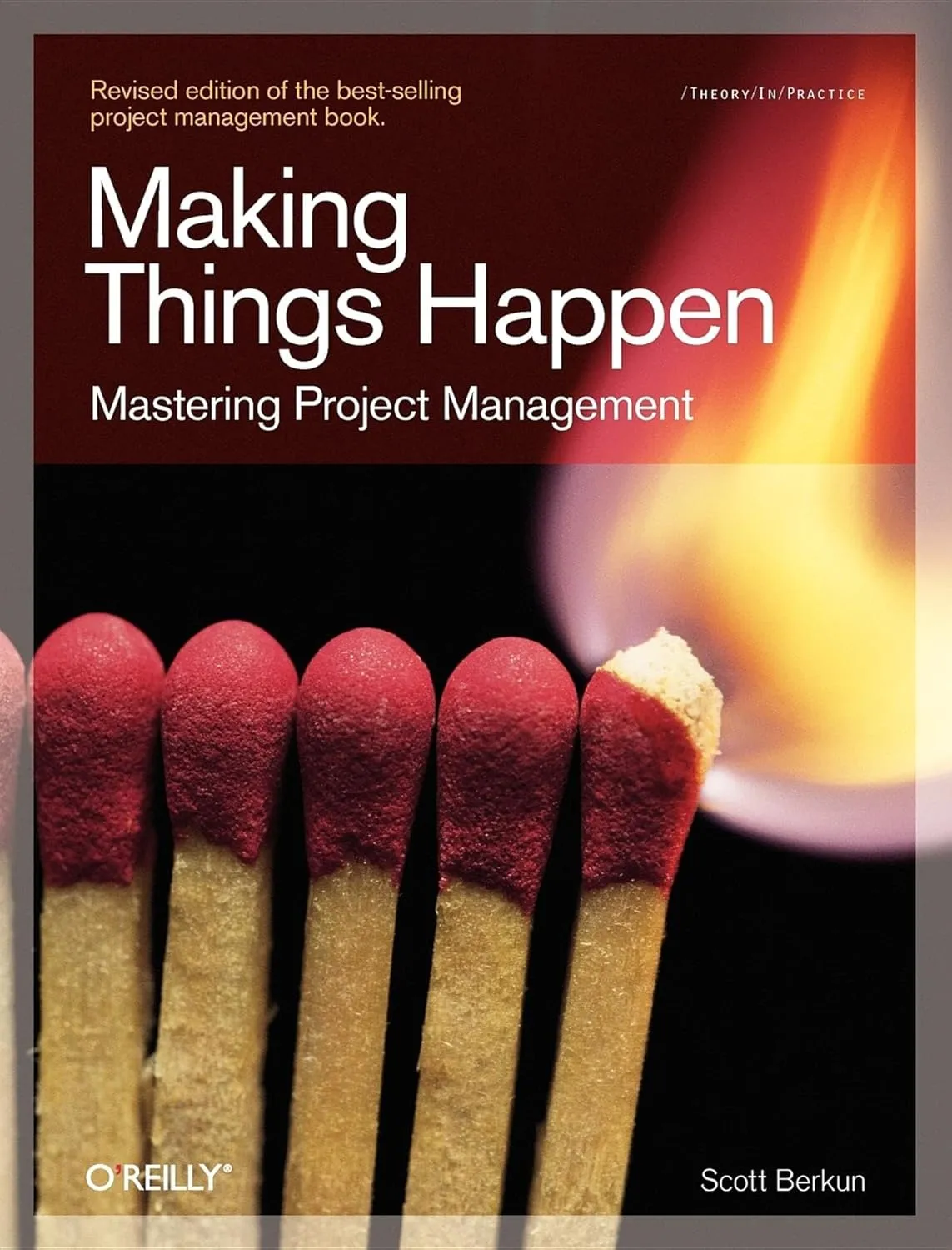About this book
Five Key Takeaways
- Anyone can manage a project, regardless of title.
- Schedules establish commitments and enhance team collaboration.
- Clear communication prevents miscommunication and project delays.
- Iterative design improves product usability and team creativity.
- Trust and commitments are crucial for effective leadership.
-
Anyone Can Lead a Project
Project management isn't exclusive to those with formal titles. Anyone can adopt its principles to achieve success in their work (Chapter 1).
By developing skills like planning and decision-making, individuals can take initiative regardless of their hierarchical roles. This democratizes leadership.
Team members’ contributions and accountability become equally important, enabling diverse and inclusive approaches to tackling projects.
Promoting this inclusivity sparks innovation and ownership among team members, turning any project into a collaborative effort.
In practice, this means anyone can take charge, align people towards shared goals, and drive results even without managerial authority.
This builds confidence in individual and group abilities, fostering an empowered and responsible workplace culture.
Applying these principles enables organizations to unlock untapped potential in every team member while enhancing performance.
Ultimately, recognizing universal project management potential prepares teams to adapt swiftly and thrive in any business environment.
-
Schedules Foster Accountability
Schedules act as contracts, ensuring clarity over responsibilities and timing for all project participants (Chapter 3).
They make dependencies visible, removing misunderstandings about task ownership or deadlines, which improves team cohesion.
Clear schedules help track progress by breaking tasks into manageable segments teams can adapt during unforeseen changes.
Team members become more accountable when expectations and roles are documented, encouraging consistent focus on goals.
When challenges arise, flexible schedules enable quick adjustments, maintaining alignment and project momentum.
Effectively used, schedules prevent lost time, miscommunication, and conflict, bolstering team dynamics and long-term success.
Moreover, updated schedules ensure that elements remain relevant, reflecting ongoing project realities and new priorities.
This use of scheduling allows projects to be completed efficiently while fostering proactive problem-solving within teams.
-
Miscommunication Is the Silent Killer
Miscommunication sabotages progress, derailing projects through unclear expectations or mismatched assumptions.
Problems often arise because team members lack clarity regarding roles, task deadlines, or overall objectives.
The stakes are high: miscommunication leads to wasted time, conflict, and inefficiency, which jeopardize productivity.
The solution lies in proactively clarifying responsibilities and ensuring transparency throughout projects (Chapter 5).
Project managers should foster open dialogue, address personal conflicts, and clarify ambiguous instructions on an ongoing basis.
Providing consistent updates creates alignment, which minimizes reactive corrections or last-minute crises among teams.
Building clear communication habits strengthens group cohesion while driving mutual understanding and shared success.
A collaborative culture ensures that every message resonates as intended, steering teams toward conflict-free efficiency.
-
Use Iterative Design in Projects
In dynamic projects, iteration avoids errors caused by rigid linear methods that fail to adapt to new insights.
Prioritize early testing through small prototypes, allowing teams to learn and refine strategies as challenges arise.
Conduct regular design feedback loops, ensuring both user needs and technical constraints are consistently addressed.
This iterative model minimizes last-minute corrections, lowering costs and risks, while enhancing overall outcomes.
Benefits include better usability, deeper clarity of evolving goals, and solutions inspired by team collaboration (Chapter 7).
Iteration also promotes adaptability by encouraging teams to learn from small experiments instead of overcommitting resources.
Skipping this process may lead to overlooked flaws becoming costly, late-stage problems with fewer avenues for resolution.
-
Write Effective Specifications
Specification documents often guide the foundation of clear communication and alignment in project management.
Write specs collaboratively to define your project's goals, key milestones, and scope while clarifying expectations for stakeholders.
Use specs to establish clarity on workflows, ensuring designers and developers remain in sync throughout iterative phases.
Specifications can be revisited and refined in response to touchpoints, preventing unnecessary bureaucracy while retaining flexibility.
Following strong spec practices contributes to measurable outputs, boosting projects' long-term performance (Chapter 8).
Without proper specifications, misaligned expectations risk derailing team momentum and introducing technical debt later.
Organization-wide alignment ensures moving priorities or features don’t confuse decision-makers at critical crossroads.
-
Strong Leadership Thrives in Crisis
When crises emerge, leaders are tested on their problem-solving skills and resilience under pressure.
Unpreparedness in leadership may allow challenges to overwhelm teams, derailing a project's goals or budgets.
These moments matter because they reveal a manager's ability to maintain both team morale and consistent strategy.
Calm analysis, collective brainstorming, and clear task delegation are core ingredients during turbulent situations (Chapter 9).
Transparency instills confidence in teams, creating a coordinated response plan everyone understands and supports.
Frequent check-ins following crises uncover lessons learned, ensuring avoidance of repeated hurdles in the future.
Scott Berkun posits that leaders who embrace accountability define themselves in those adversities, improving team trust profoundly.
-
Cultivate Trust as a Leader
Trust forms relationships’ backbone, particularly in workplaces where collaboration relies on genuine accountability and honesty.
Demonstrate integrity by consistently delivering on commitments, strengthening how subordinates and peers perceive reliability.
Admit mistakes openly while seeking collective resolutions ensures mistakes aren't buried but treated as tools of growth.
Actively build environments where risky honesty isn’t feared—your openness ultimately builds stronger innovation pipelines.
Betrayed trust erodes harmony faster than regained integrity patches—even cautious reparations pale under repeated dishonor.
-
Commitments Serve as a Trust Metric
Every upheld commitment boosts credibility, whereas breaking promises diminishes workplace confidence (Chapter 4).
Unmet obligations lead colleagues questioning motivations—even unintentionally ignored delays erode leader perceptions otherwise positive.
Conversely, delivering beyond timelines reinforces stability, team unity significantly lasting while commitment-making reciprocates together.
Neglecting thoughtful feasibility evaluations degrades performance sustainability team-wide longer-term relationships.




















